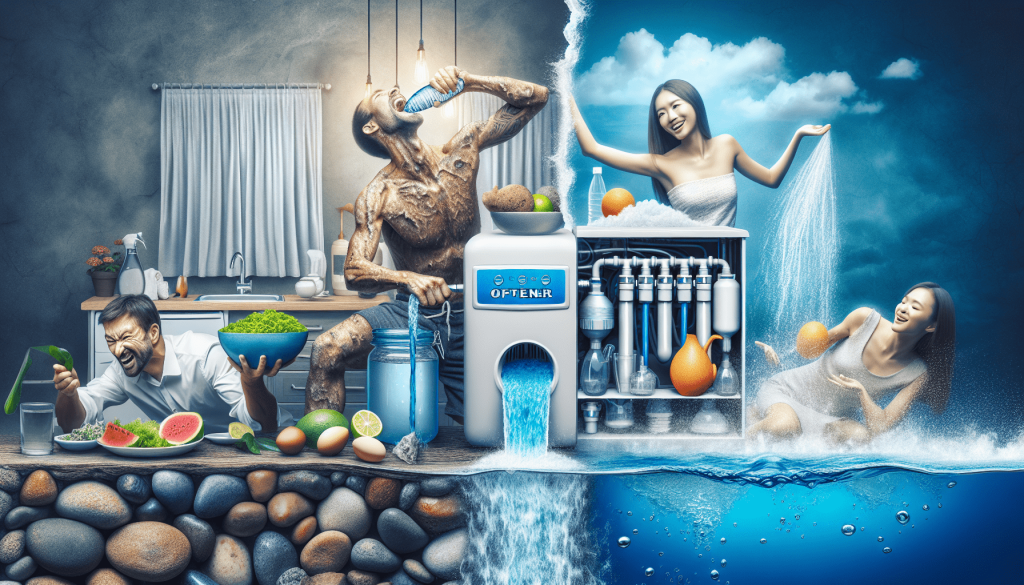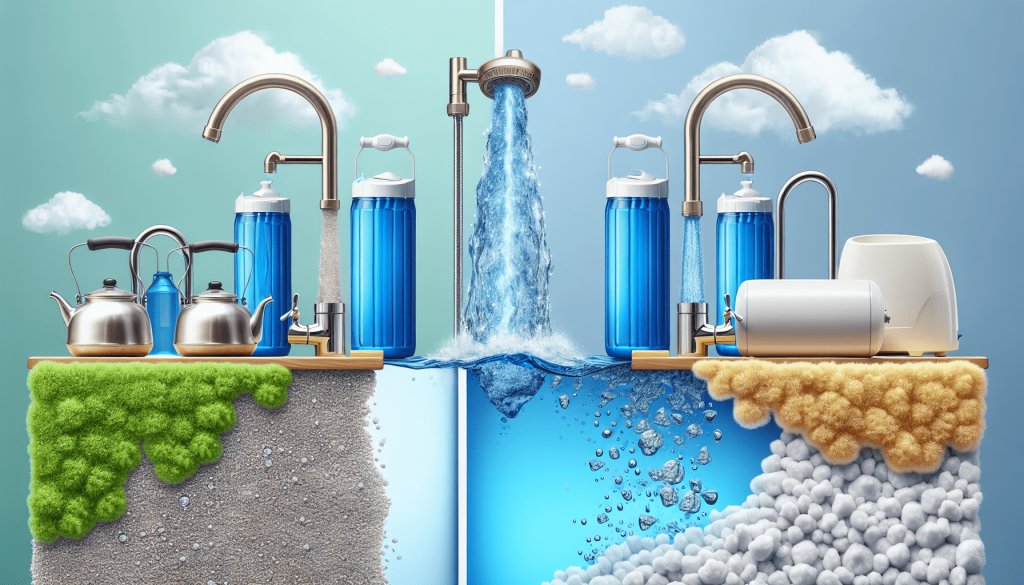Have you ever wondered if you really need a water softener? Well, you’re not alone. Many people are unsure about whether they should invest in a water softener or not. In this article, we will explore the benefits of having a water softener and help you determine if it’s a necessity for your household. So, grab a cup of coffee and let’s find out if a water softener is something you should consider!
Understanding Hard Water
What is hard water?
Hard water is a common issue that many households face. It refers to water that contains high levels of minerals such as calcium and magnesium. These minerals are picked up by the water as it travels through rocks and soil, and they can have a significant impact on our daily lives.
Effects of hard water on household appliances
One of the primary effects of hard water is the buildup of scale in household appliances. As hard water flows through pipes, it leaves behind mineral deposits that accumulate over time. This buildup can clog pipes and reduce water flow, leading to plumbing issues. Additionally, the minerals in hard water can cause damage to appliances such as dishwashers and washing machines, decreasing their lifespan and efficiency.
Impact of hard water on skin and hair
Hard water can also have negative effects on our skin and hair. The minerals in hard water can leave a residue on our skin, making it feel dry and irritated. It can also cause our hair to become dull, lifeless, and difficult to manage. This is because the minerals in hard water can create a barrier on the hair, preventing it from absorbing moisture effectively.
Benefits of Water Softeners
Prevents scale buildup in pipes and appliances
One of the main advantages of using a water softener is that it prevents the buildup of scale in pipes and appliances. By removing the minerals that cause hardness, a water softener helps to keep pipes clean and maintain water flow. This not only reduces the risk of plumbing issues but also extends the longevity of your appliances.
Extends the lifespan of household appliances
Hard water can be harsh on household appliances, leading to premature wear and tear. By using a water softener, you can protect your appliances from the damaging effects of mineral deposits. This, in turn, extends their lifespan and saves you money on costly repairs or replacements.
Reduces soap scum and improves cleaning efficiency
Another benefit of water softeners is their ability to reduce soap scum and improve cleaning efficiency. Hard water can prevent soap and detergents from lathering properly, making it difficult to clean dishes, clothes, and surfaces effectively. With a water softener, soap and detergents can work more efficiently, resulting in cleaner and spot-free results.
Improves the effectiveness of personal care products
Using a water softener can also enhance the effectiveness of personal care products. Hard water can prevent shampoo, conditioner, and other products from fully performing their intended functions. By removing the minerals in hard water, a water softener allows these products to work more effectively, leaving your hair and skin looking and feeling healthier.
Reduces skin dryness and irritation
If you’ve been experiencing dry and irritated skin, hard water may be the culprit. The minerals in hard water can strip away the skin’s natural oils, leading to dryness and discomfort. By using a water softener, you can alleviate these issues and promote healthier and more hydrated skin.
Saves money on energy bills
Believe it or not, using a water softener can actually save you money on your energy bills. When pipes and appliances are free from scale buildup, they can function more efficiently. This means that your water heater, for example, doesn’t have to work as hard to heat the water, resulting in lower energy consumption and reduced costs.

Determining Water Hardness
Testing water hardness
Determining the hardness of your water is a crucial step in understanding whether or not you need a water softener. Thankfully, there are simple and affordable ways to test water hardness. You can purchase a water hardness test kit from a hardware store or get in touch with a local water testing lab. These kits typically include test strips that change color based on the mineral content in the water, allowing you to assess its hardness level.
Interpreting water hardness test results
Once you’ve tested your water, it’s important to interpret the results correctly. Water hardness is typically measured in grains per gallon (GPG) or parts per million (PPM).
- If the test shows a hardness level below 1 GPG or 17.1 PPM, your water is considered soft.
- A hardness level between 1-3.5 GPG or 17.1-60 PPM is considered slightly hard.
- Moderate hardness falls within the range of 3.5-7 GPG or 60-120 PPM.
- Water with a hardness level above 7 GPG or 120 PPM is considered hard.
Understanding your water hardness level will help you make an informed decision about whether or not to invest in a water softener.
Consider Your Location
Regions with naturally soft water
Certain regions are fortunate to have naturally soft water. These areas have lower mineral levels, resulting in water that doesn’t require a water softener. If you live in one of these regions, you may not need to invest in a water softener at all. However, it’s still important to periodically test your water to ensure that the mineral content hasn’t changed over time.
Regions with hard water
Unfortunately, many regions around the world have hard water. Depending on the severity of the hardness, investing in a water softener may be necessary. Hard water can lead to various issues, including damage to your plumbing, appliances, and personal care items. Therefore, if you live in an area with hard water, a water softener can be a wise investment.
Municipal water vs. well water
The source of your water can also affect its hardness. Municipal water, which is typically sourced from lakes, rivers, or underground wells, often contains a certain level of hardness. On the other hand, well water, which is obtained from a private well on your property, can vary significantly in terms of hardness. Regardless of the source, it’s essential to determine the hardness of your water to assess if a water softener is necessary.

Identifying Signs of Hard Water
Visible scale deposits on faucets and appliances
One noticeable sign of hard water is the presence of scale deposits on faucets, showerheads, and appliances. These deposits appear as white or yellowish buildup and can be difficult to clean. If you’ve noticed these deposits on your fixtures, it’s likely that you have hard water.
Difficulty lathering soap or shampoo
If you find it challenging to create a lather when using soap or shampoo, hard water may be to blame. The minerals in hard water can interfere with the lathering process, making it difficult to properly cleanse your skin and hair. If you’re experiencing this issue regularly, it may be time to consider a water softener.
Dry and itchy skin
Dry and itchy skin is a common symptom of hard water. The mineral content in hard water can strip away the natural oils on your skin, leading to dryness, irritation, and even eczema flare-ups. If you’ve been dealing with persistently dry and itchy skin, a water softener may provide much-needed relief.
Dull and dingy laundry
Hard water can also have an impact on your laundry. The minerals in hard water can react with soap and detergent, leaving a residue on your clothes, towels, or bed sheets. This can make your laundry appear dull, dingy, and less clean than it should be. If you’re tired of lackluster laundry results, a water softener can help you achieve brighter and fresher garments.
Frequent plumbing issues
If you’ve been experiencing frequent plumbing issues such as clogs, reduced water pressure, or pipe corrosion, hard water may be the root cause. The mineral deposits left behind by hard water can accumulate in your pipes, leading to blockages and damage. By installing a water softener, you can prevent these issues and maintain a healthy plumbing system.
Alternative Solutions to Water Softeners
Using citric acid or vinegar
If you’re looking for a more natural approach to tackling hard water, you may consider using citric acid or vinegar. These household ingredients can act as mild water softeners, helping to remove some of the mineral buildup. However, it’s important to note that these methods may not be as effective as a dedicated water softener and may require more frequent application.
Adding chelating agents or sequestering agents
Chelating agents and sequestering agents are compounds that can bind to the minerals in hard water, preventing them from causing problems. These agents can be added to your water supply to help mitigate the effects of hard water. While they can offer some relief, they may not completely eliminate the issues associated with hard water.
Installing a water conditioner
Another alternative to traditional water softeners is installing a water conditioner. Water conditioners use different technologies such as magnetic fields or catalytic converters to alter the structure of the minerals in hard water. This alteration reduces the negative effects of hard water without removing the minerals entirely. While water conditioners can be effective for some households, they may not offer the same level of softening as a traditional water softener.

Cost Considerations
Initial purchase and installation cost
When considering a water softener, it’s essential to take into account the initial purchase and installation cost. The price of water softeners can vary depending on factors such as capacity, brand, and additional features. It’s recommended to research different options and obtain quotes from reputable suppliers or plumbers to determine the cost that aligns with your budget.
Maintenance expenses
Water softeners also require regular maintenance to ensure optimal performance. This includes replenishing the softener resin or salt, cleaning the brine tank, and occasionally sanitizing the system. It’s important to factor in these ongoing maintenance expenses when evaluating the overall cost of owning a water softener.
Savings on appliances and pipework replacement
Although the upfront cost of a water softener may seem significant, it’s crucial to consider the potential savings in the long run. By preventing scale buildup in pipes and appliances, a water softener helps to prolong their lifespan. This means you may save money on costly repairs or replacements that can be caused by hard water damage.
Long-term cost-effectiveness
While it’s understandable to be cautious about the cost of a water softener, it’s important to recognize the long-term cost-effectiveness. When you consider the potential savings on appliances, reduced energy consumption, and the overall improvement in the quality of water in your home, investing in a water softener can be a wise financial decision.
Environmental Impact
Salt-based water softeners and their impact
Traditional salt-based water softeners have long been popular for their effectiveness in removing minerals from hard water. However, these systems produce a significant amount of brine waste during the regeneration process. This brine waste, when discharged into the sewer system, can have a negative impact on the environment and contribute to increased salinity levels in waterways.
Salt-free water conditioners and their benefits
For those concerned about the environmental impact of salt-based water softeners, salt-free water conditioners are a viable alternative. These systems don’t remove minerals from the water entirely but rather alter their structure, reducing their negative effects. Salt-free water conditioners are generally considered more eco-friendly since they don’t rely on the use of salt or produce brine waste.
Eco-friendly alternatives
In addition to salt-free water conditioners, there are other eco-friendly alternatives available. Some options include using activated carbon filters, reverse osmosis systems, or electrochemical water treatment devices. These alternatives provide varying levels of hardness reduction and can be more environmentally friendly compared to traditional salt-based water softeners.

Consulting a Water Specialist
Professional water analysis
If you’re unsure about the hardness level of your water or the best solution for your specific needs, it’s wise to consult a water specialist. These experts can conduct a comprehensive water analysis to assess the mineral content and provide tailored recommendations. They can help you determine the appropriate water softening system or alternative solution based on your water quality and preferences.
Expert advice on choosing the right system
Choosing the right water softening system can be a daunting task, given the numerous options available in the market. To make an informed decision, it’s beneficial to seek expert advice from water specialists. They can guide you through the process, explain the pros and cons of different systems, and help you select the one that best suits your needs and budget.
Conclusion
Before deciding on whether or not to invest in a water softener, take the time to understand the impact of hard water on your household appliances, skin, and hair. Consider the benefits that water softeners provide, such as preventing scale buildup and improving cleaning efficiency. Determine the hardness of your water through testing and assess your location to understand the prevalence of hard water in your region. Look out for signs of hard water, such as visible scale deposits and dry skin. Explore alternative solutions to water softeners, keeping in mind their effectiveness and cost. Evaluate the environmental impact of different water softening options and consider seeking professional advice to ensure that you choose the right system for your specific needs. With all these considerations in mind, you’ll be well-equipped to make an informed decision about whether or not a water softener is necessary for your home.



